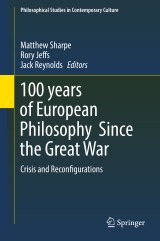Details

100 years of European Philosophy Since the Great War
Crisis and ReconfigurationsPhilosophical Studies in Contemporary Culture, Band 25
|
96,29 € |
|
| Verlag: | Springer |
| Format: | |
| Veröffentl.: | 14.02.2017 |
| ISBN/EAN: | 9783319503615 |
| Sprache: | englisch |
Dieses eBook enthält ein Wasserzeichen.
Beschreibungen
<p>This book is a collection of specifically commissioned articles on the key continental European philosophical movements since 1914. It shows how each of these bodies of thought has been shaped by their responses to the horrors set in train by World War I, and considers whether we are yet ‘post-post-war’. The outbreak of World War I in August 1914,set in chain a series of crises and re-configurations, which have continued to shape the world for a century: industrialized slaughter, the end of colonialism and European empires, the rise of the USA, economic crises, fascism, Soviet Marxism, the gulags and the <i>Shoah</i>. Nearly all of the major movements in European thinking (phenomenology, psychoanalysis, Hegelianism, Marxism, political theology, critical theory and neoliberalism) were forged in, or shaped by, attempts to come to terms with the global trauma of the World Wars. This is the first book to describe the development of these movements after World War I, andas such promises to be of interest to philosophers and historians of philosophy around the world.</p><p><br></p><p></p>
Introduction: European thought, after the Deluge; Rory Jeffs and Matthew Sharpe.- Part I: Singin’ in the Shade?.- 1. Singin’ in the Shade: An Introduction to Post-Post-War Thought; William H. F. Altman.- 2. Nationality, State and Global Constitutionalism in Hermann Cohen’s Wartime Writings; Miguel Vatter.- Part II: Weimar and its shadows.- 3. The Sons destined to Murder their Father: Crisis in Interwar Germany; Petra Brown.- 4. The Spengler Connection: Total Critiques of Reason and The Decline of the West; Julian Potter.- 5. The Significance of World War One in Jan Patočka’s Philosophy; Daniel Brennan.- Part III: Intellectual movements.- 6. A New Vision of How the Great War Influenced Freud’s Psychoanalysis; Talia Morag.- 7. The Long Shadow of Leninist Politics: Radical Strategy and Revolutionary Warfare after a Century; Geoff Boucher.- 8. Hegel in Dark Times: The Resurrections of Geist from the Ashes of War; Rory Jeffs.- 9. The Spectre of Collectivism: Neoliberalism, the Wars, and Historical Revisionism; Damien Cahill.- Part IV: Academic philosophy in a time of wars.- 10. The divide between philosophy and enthusiasm: The Effect of the World Wars on Relations between British and Continental Philosophies; Sherah Bloor.- 11. Philosophy and/or politics? Two trajectories of philosophy after the Great War and their contamination; Jack Reynolds.- Part V: After the wars have ended?.- 12. Modernity, civilisation, culture and the ‘War to end all Wars’: Or we begin and end in the mess; John Rundell.- 13. 1750, casualty of 1914? Lest we forget (The preKantian enlightenment); Matthew Sharpe.- List of Contributors. </p><p></p>
<p><b>Profile Author / Editor 1:</b> AsPro Sharpe teaches philosophy at Deakin University, and is a founding member of the Melbourne School of Continental Philosophy. He is the author of articles on European philosophy, psychoanalysis, critical theory and the history of ideas, and of <em>Camus, Philosophe</em> (Brill, 2015), and a member of several Australian Research Council grants in the humanities. <b><br></b></p><p><<p><b>Profile Author / Editor 2:</b> </p>Rory Jeffs is completing his PhD on the work and legacy of Alexandre Kojève’s philosophy at Deakin University, where he also teaches on a sessional basis. He is the author of several articles on Kojève and 20<sup>th</sup> century readings of Hegel, as well as on other subjects such as Marxism and political theology. <p></p><p><b>Profile Author / Editor 3:</b> Jack Reynolds is Professor of Philosophy at Deakin University. He has written four books: <i>Chronopathologies: The Politicsof Time in Deleuze, Derrida, Analytic Philosophy and Phenomenology</i> (2012<i>), Analytic Versus Continental: Arguments on the Methods and Value of Philosophy</i> (2011, with James Chase), <i>Merleau-Ponty and Derrida: Intertwining Embodiment and Alterity</i> (2004), and <i>Understanding Existentialism</i> (2006). He has also co-edited six collections, including <i>Sartre: Key Concepts</i> (2013<i>), Continuum Companion to Existentialism </i>(2011<i>), Postanalytic and Metacontinental: Cr</i>ossing Philosophical Divides (2010), and <i>Merleau-Ponty: Key Concepts</i> (2008). He is currently writing a book called <i>Phenomenology, Naturalism and Empirical Science: A Hybrid and Heretical Proposal</i> (forthcoming, Routledge)</p><p></p>
This book is a collection of specifically commissioned articles on the key continental European philosophical movements since 1914. It shows how each of these bodies of thought has been shaped by their responses to the horrors set in train by World War I, and considers whether we are yet ‘post-post-war’. The outbreak of World War I in August 1914,set in chain a series of crises and re-configurations, which have continued to shape the world for a century: industrialized slaughter, the end of colonialism and European empires, the rise of the USA, economic crises, fascism, Soviet Marxism, the gulags and the <i>Shoah</i>. Nearly all of the major movements in European thinking (phenomenology, psychoanalysis, Hegelianism, Marxism, political theology, critical theory and neoliberalism) were forged in, or shaped by, attempts to come to terms with the global trauma of the World Wars. This is the first book to describe the development of these movements after World War I, and as such promises to be of interest to philosophers and historians of philosophy around the world.<p></p><p></p>
The first collection of specifically commissioned articles on the reaction of all the key continental European philosophical movements to the catastrophes set in chain after August 1914 Considers how each of the major movements in European thinking were forged in, or shaped by, attempts to come to terms with the global trauma of the World Wars Boasts an enviable array of leading philosophers, critical theorists (and one political economist) with international profiles and reputations Includes supplementary material: sn.pub/extras

















